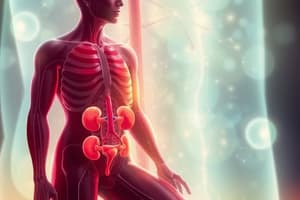Podcast
Questions and Answers
What is the primary purpose of excretion in the body?
What is the primary purpose of excretion in the body?
- To absorb nutrients and energy
- To enhance respiratory efficiency
- To maintain homeostasis and eliminate toxic substances (correct)
- To facilitate digestion of food
Which organ is primarily responsible for filtering blood and producing urine?
Which organ is primarily responsible for filtering blood and producing urine?
- Skin
- Liver
- Kidneys (correct)
- Lungs
What type of waste includes byproducts like urea and carbon dioxide?
What type of waste includes byproducts like urea and carbon dioxide?
- Metabolic Waste (correct)
- Cellular Waste
- Excess Nutrients
- Foreign Substances
What process involves the removal of additional waste products into the urine?
What process involves the removal of additional waste products into the urine?
Which of the following substances is primarily excreted through the skin?
Which of the following substances is primarily excreted through the skin?
What is a significant consequence of kidney disease on the excretory process?
What is a significant consequence of kidney disease on the excretory process?
What role does the liver play in the excretory system?
What role does the liver play in the excretory system?
Which process contributes to the regulation of hydration levels in the body?
Which process contributes to the regulation of hydration levels in the body?
Flashcards are hidden until you start studying
Study Notes
Overview of Excretion
- Definition: Excretion is the biological process of removing waste products from the body.
- Purpose: Maintains homeostasis, regulates body fluids, and eliminates toxic substances.
Types of Excretion
- Metabolic Waste: Byproducts of cellular metabolism (e.g., urea, carbon dioxide).
- Excess Nutrients: Surplus vitamins, minerals, and other nutrients.
- Foreign Substances: Toxins and drugs.
Major Organs of Excretion
- Kidneys:
- Filter blood, remove urea, excess salts, and water; produce urine.
- Functional unit: Nephron.
- Liver:
- Converts ammonia into urea; detoxifies harmful substances.
- Produces bile for fat digestion.
- Lungs:
- Excrete carbon dioxide from respiration.
- Skin:
- Removes sweat (water, salts, urea) through sweat glands.
Excretory Processes
-
Kidney Function:
- Filtration: Blood plasma filtered in the glomerulus.
- Reabsorption: Essential nutrients and water reabsorbed back into the bloodstream.
- Secretion: Additional waste products secreted into the urine.
- Excretion: Urine excreted through the ureters to the bladder.
-
Liver Function:
- Metabolizes substances; produces urea.
- Excretes bile into the intestines for elimination of waste.
-
Lung Function:
- Gas exchange; carbon dioxide expelled with each breath.
Importance of Excretion
- Homeostasis: Helps to maintain balance of salts, water, and pH levels.
- Detoxification: Eliminates harmful substances, aiding in overall health.
- Fluid Regulation: Manages hydration levels through urine concentration.
Disorders Related to Excretion
- Kidney Disease: Impairs filtration, leading to waste accumulation.
- Liver Failure: Inability to detoxify and process waste effectively.
- Respiratory Disorders: Affect carbon dioxide elimination.
Key Terms
- Urea: Main nitrogenous waste product formed from protein metabolism.
- Nephron: Functional unit of the kidney.
- Filtrate: Liquid that passes through the kidneys, containing waste and excess substances.
Summary
Excretion is a vital process for removing waste materials from the body and maintaining physiological balance through the coordinated actions of various organs, primarily the kidneys, liver, lungs, and skin. Understanding the mechanisms and implications of excretion is crucial for recognizing health and disease states.
Overview of Excretion
- Excretion is the biological process that eliminates waste products from the body.
- Its main roles include maintaining homeostasis, regulating body fluids, and removing toxic substances.
Types of Excretion
- Metabolic waste includes byproducts like urea and carbon dioxide from cellular processes.
- Excess nutrients refer to surplus vitamins and minerals that need to be expelled.
- Foreign substances are toxins and drugs that the body must eliminate.
Major Organs of Excretion
- Kidneys:
- Key in filtering blood to remove waste such as urea, excess salts, and water, leading to urine production.
- The nephron is the functional unit crucial for kidney operations.
- Liver:
- Converts ammonia, a toxic byproduct of protein metabolism, into urea.
- Detoxifies harmful substances and produces bile to aid in fat digestion.
- Lungs:
- Responsible for expelling carbon dioxide, a waste product of respiration.
- Skin:
- Removes waste through sweat, which contains water, salts, and urea.
Excretory Processes
- Kidney Function:
- Filtration: Blood plasma is filtered in the glomerulus to remove wastes.
- Reabsorption: Essential nutrients and water are reclaimed into the bloodstream.
- Secretion: Additional waste products enter urine.
- Excretion: Urine is expelled through ureters to the bladder.
- Liver Function:
- Metabolizes various substances and generates urea.
- Bile is excreted into the intestines to eliminate waste.
- Lung Function:
- Facilitates gas exchange; carbon dioxide is expelled with exhalation.
Importance of Excretion
- Homeostasis: Keeps the body’s salt, water, and pH levels balanced.
- Detoxification: Removes harmful substances, promoting overall health.
- Fluid Regulation: Controls hydration levels by adjusting urine concentration.
Disorders Related to Excretion
- Kidney Disease: Results in impaired filtration, leading to waste accumulation in the body.
- Liver Failure: Affects the liver's ability to detoxify and process waste products.
- Respiratory Disorders: Compromise the elimination of carbon dioxide.
Key Terms
- Urea: The primary nitrogenous waste produced from protein metabolism.
- Nephron: The fundamental functional unit of the kidney.
- Filtrate: The liquid composed of waste and excess substances filtered through the kidneys.
Summary
Excretion plays a vital role in waste removal and the maintenance of physiological balance through the coordinated function of organs like the kidneys, liver, lungs, and skin. Understanding excretion mechanisms is crucial for recognizing health and disease states.
Studying That Suits You
Use AI to generate personalized quizzes and flashcards to suit your learning preferences.




